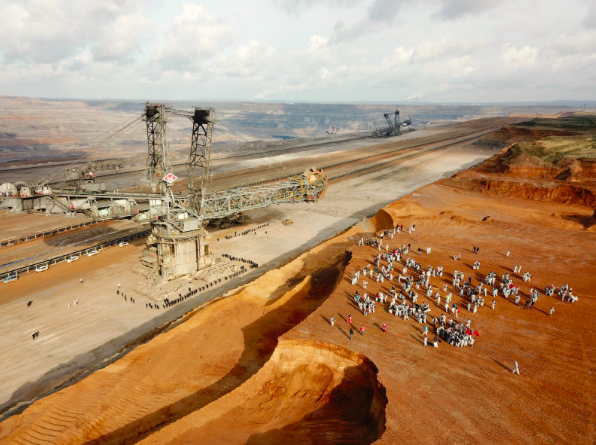An activist reports from fossil fuel protests surrounding the UN climate summit in Germany.

As civil society groups, politicians, and businesses met in Bonn for the annual UN climate talks last week, thousands of anti-fossil fuel activists occupied one of Germany’s biggest coal mines. Lise Masson, who was there, reports.
Germany is often depicted as a leader in renewable energy, yet it is home to one of the biggest, ugliest, dirtiest coal mines in Europe. To challenge this false narrative, activists took direct action last week.
On Sunday 5th November thousands of activists protested in the city of Buir, and occupied the Hambach coal mine to give a clear message: here and no further, Ende Gelände.
If we are serious about tackling the climate crisis that is impacting, displacing, and killing hundreds of thousands of people around the world, fossil fuels need to be left in the ground.
I was with the protest at the Hambach coal mine. We met violent repression from the police: pepper spray, batons, and even horses charges.
As I made my way through the police line, I found myself hit and thrown to the ground. I’ve witnessed police brutality before, while opposing fracking in Lancashire, so I wasn’t too surprised — I was confused though.
Confused as to why our protests justify such violence. Climate justice activists are not aggressive, dangerous criminals, but ordinary people standing up for what they believe in. Yet everywhere they face violent state repression.
And as activists from the global north, we have it relatively easy. While we face pepper spray and fines, our comrades in others parts of the world are being murdered every day for their beliefs.
We need to show solidarity with those risking their lives to save us from climate disaster, but most importantly we need stronger protection for environmental and human rights activists worldwide.

Transitioning from Ende Gelände to the COP23 conference was interesting. The contrast between the direct action we’d just been a part of and this cold, stale space full of men in suits was striking.
And there too, at COP, we activists were being shut down. Civil society’s influence on the talks is hugely restricted by the rules and regulations of the conference organisers.
The conference centre was divided in two zones. Whilst the Bula zone hosts the actual negotiations and press conferences, the Bonn zone is home of side events and talks.
This puts us all in a situation where we are bound to make a choice — you either follow the negotiations or engage with other groups fighting for climate justice.
This not only alienates us activists in one zone, it also puts the negotiators in a bubble where they are even more difficult to reach.
But people power is not stopped that easily. In Bonn as everywhere else, people organise and mobilise to make sure their voice is heard loud and clear.
At Ende Gelände 4,500 people took part in the demonstration, 2,500 made it to the mine, and 3 of the biggest diggers in the world were stopped. The action received wide and positive coverage in the news.
Alternative spaces such as the People’s Climate Summit and the Art Space enabled activists in Bonn to meet, share experiences, create, and organise outside the white walls and artificial lights of the COP centre.
Groups inside and outside of COP also took bold and creative actions despite the restrictions imposed by the space.
From calling out the European Investment Bank on a $2 billion loan for a mega pipeline, to disrupting a meeting organised by the US to promote fossil fuels, actions every single day voiced the demands of those who fight for climate justice.
This year I left COP feeling exhausted and a bit broken, but also hugely inspired by the commitment and resilience of the people I got to meet and work with.
This is the greatest paradox of COP, it gathers both the best and the worst people, and is both the most inspiring and depressing place to be. To COP and cops I say see you next year in Poland, because no matter how hard you try, we won’t be silenced.
Lise Masson is an environmental activist and tweets here.
To reach hundreds of thousands of new readers and to make the biggest impact we can in the next general election, we need to grow our donor base substantially.
That's why in 2024, we are seeking to generate 150 additional regular donors to support Left Foot Forward's work.
We still need another 124 people to donate to hit the target. You can help. Donate today.



